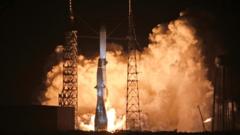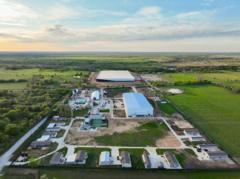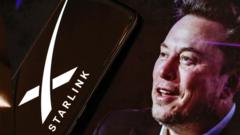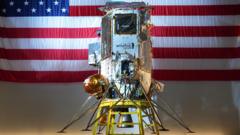In a historic move to challenge Elon Musk's established space frontier, Jeff Bezos's Blue Origin marked a significant milestone with the launch of its New Glenn rocket from Cape Canaveral, Florida. This groundbreaking event establishes a fierce rivalry in the competitive arena of commercial space travel, as both billionaires aim to reshape the landscape of space exploration by deploying larger and more adept rockets. Bezos's New Glenn soared into orbit, though it fell short in landing its main engine as intended, creating anticipation for future launches and deeper scrutiny of the evolving dynamics between SpaceX and Blue Origin.
Elon Musk's Space Race Rival: New Glenn Rocket Successfully Launches

Elon Musk's Space Race Rival: New Glenn Rocket Successfully Launches
Jeff Bezos's Blue Origin successfully launched its New Glenn rocket, intensifying competition with Elon Musk's SpaceX.
Blue Origin's New Glenn rocket, towering at 98 meters, was launched at 02:02 local time on Thursday, with applause from onlookers as it successfully achieved orbit after overcoming prior technical complications. Although the booster did not return for reuse, the launch signifies a leap for Blue Origin, addressing years of setbacks as it struggles to achieve a competitive pace against Musk's prolific SpaceX, which completed 134 rocket launches in the previous year alone. The New Glenn's design carries more satellites and is central to Bezos's plans to operationalize Project Kuiper, an initiative aimed at deploying thousands of low-earth satellites to provide broadband services, in direct competition with Musk's Starlink.
Bezos's ambition, founded on a vision of enabling millions to live and work in space, has long faced criticism for its slower progress. With the successful flight of New Glenn, analysts speculate that this marks the beginning of a more formidable rivalry in the space race, potentially leading to reduced costs and enhanced innovation across both firms. As both Blue Origin and SpaceX set their sights on ambitious goals, including the establishment of private space stations and lunar transportation, the landscape of public and private space exploration is on the brink of significant evolution.
Bezos's ambition, founded on a vision of enabling millions to live and work in space, has long faced criticism for its slower progress. With the successful flight of New Glenn, analysts speculate that this marks the beginning of a more formidable rivalry in the space race, potentially leading to reduced costs and enhanced innovation across both firms. As both Blue Origin and SpaceX set their sights on ambitious goals, including the establishment of private space stations and lunar transportation, the landscape of public and private space exploration is on the brink of significant evolution.



















